“A fine little girl, she waits for me” – these are the opening lines of the first verse of a song that has resonated through generations, becoming a cornerstone of rock and roll history. But before those iconic verses, the song explodes with its unforgettable chorus: “Louie Louie, me gotta go.” This simple yet powerful phrase has launched countless renditions and fueled decades of rock and roll fervor.
The song’s title, intentionally written without a comma as “Louie Louie,” sparks immediate intrigue. Is it the name of a person? Perhaps the singer’s companion on a seafaring journey? Interestingly, the line “I sail the ship all alone” dispels the notion of a shipmate named Louie Louie, suggesting a different interpretation.
Some propose that the singer is addressing a bartender, encountered on a distant Caribbean island. Regardless of the intended recipient, the core message is clear: a longing to return home from the Caribbean Sea and reassure his beloved, “I’ll never leave again.”
Originally released in 1957 as the B-side to You Are My Sunshine, “Louie Louie” initially missed its mark on national pop and R&B charts. However, it quietly began to gain traction, becoming a favorite among young bands, particularly in the vibrant music scene of the Pacific Northwest.
By 1961, Rockin’ Robin Roberts and the Wailers unleashed a raw, garage-infused version of Louie Louie. This rendition ignited a regional firestorm, becoming a massive hit from Oregon to British Columbia. It seemed every band in the area embraced the song, adding it to their setlists. Then, in 1963, Paul Revere & the Raiders and the Kingsmen both released their versions, intensifying the song’s burgeoning popularity.
It was The Kingsmen’s rendition, deeply rooted in Roberts’ version, that propelled “Louie Louie” to a legendary status. Music critics and rock historians have spent years searching for superlatives to capture the sheer impact of hearing and feeling this groundbreaking recording.
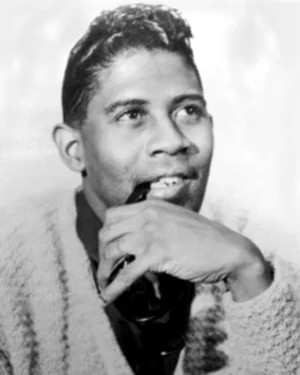 RichardBerry photo 1950s 800 crop copy
RichardBerry photo 1950s 800 crop copy
Richard Berry, the original singer and songwriter of “Louie Louie,” in a publicity photo from the late 1950s.
The Enigmatic Vocals: Misheard Lyrics and Urban Legends
The Kingsmen’s recording of “Louie Louie” was marked by a distinct lo-fi production, or perhaps a deliberate lack thereof. Lead singer Jack Ely’s vocals emerged from the mix, not entirely clear, somewhat muffled, and wonderfully garbled. This sonic ambiguity became a cultural phenomenon, as millions of young listeners across America began to project “dirty” lyrics onto the song.
Decades later, the esteemed New Yorker magazine delved into this fascinating aspect of the song’s history with an insightful article titled “Is This The Dirtiest Song Of The Sixties?”. The article explored how the recording environment contributed to the vocal obscurity.
“On that April day in 1963, the only microphone available to Ely was located several feet above him, hanging from the ceiling. Ely was wearing dental braces, and his bandmates, who were gathered around Ely in a circle, played their instruments loudly. The result was an incomprehensible vocal that, in time, would make Ely the most celebrated interpreter of a song which is close to being pop Esperanto.”
“Louie Louie” endures as a quintessential rock & roll recording and remains one of the most covered songs in the last sixty years of popular music.
The song’s chord progression is famously simple: A, D, E minor. Its lyrical structure is equally accessible. As the New Yorker article points out, “As for the lyrics, it doesn’t matter how you sing them, or even really what you sing, though you might consider beginning with the words ‘Louie Louie / Oh no / Me gotta go.’ Really, though, the floor is yours. Sing your grocery list. Pull random words from a hat.”
This perceived lyrical ambiguity, coupled with the raw energy of the Kingsmen’s performance, fueled the widespread belief in the 1960s that the band had slipped something illicit into a song played on public airwaves, accessible to young ears. This cultural perception reached such a fever pitch that it triggered an official FBI investigation! This investigation stretched throughout 1965, yet even the agency’s linguistic experts were unable to decipher Ely’s exact lyrics, leading them to ultimately drop the case.
The saga of “Louie Louie” is rich and multifaceted. However, the primary focus here is to present the original lyrics penned by Richard Berry in his 1956 recording, alongside the “dirty” lyrics that became part of the Kingsmen’s 1963 version’s mythology.
Before diving into the lyrics, it’s highly recommended to open a new browser tab, navigate to YouTube, and listen to both versions of the song while reading along. This immersive experience will enhance your understanding and appreciation of the nuances discussed.
 RichardBerry LouieLouie Flip 78 800
RichardBerry LouieLouie Flip 78 800
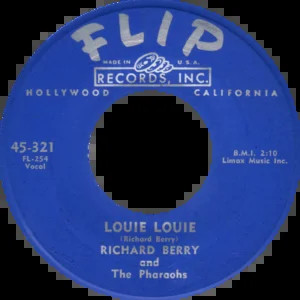 RichardBerry LouieLouie Flip 800
RichardBerry LouieLouie Flip 800
Original pressings of Richard Berry & The Pharaohs’ “Louie Louie” were released as both 78 rpm and 45 rpm records.
Richard Berry’s Original “Louie Louie” Lyrics
Below are the lyrics to “Louie Louie” as Richard Berry recorded them in 1956. Both sides of the original record (Flip 254 and 321) are credited to Richard Berry and The Pharaohs. The Pharaohs, for this recording, were a collective of vocalists Berry collaborated with.
At the time of the recording, the Pharaohs consisted of:
- Godoy Colbert, first tenor
- Noël Collins, baritone
- Stanley Henderson, second tenor
Berry envisioned the song and its performance as an homage to the then-popular calypso music, popularized in the United States by Harry Belafonte. However, the recording commences with a distinctive, repetitive doo-wop bassline (“Duh duh duh—duh duh—duh duh duh”) that becomes a constant thread throughout the song.
Here are Richard Berry’s authentic “Louie Louie” song lyrics:
Louie Louie, me gotta go. Louie Louie, me gotta go.
Fine little girl, she wait for me. Me catch the ship across the sea. I sail the ship all alone. I never think I’ll make it home.
Louie Louie, I said me gotta go. Louie Louie, me gotta go.
Three nights and days, me sailed the sea. Me think of girl constantly. On the ship, I dream she there. I smell the rose in her hair.
Louie Louie, me gotta go. Well, Louie Louie, me gotta go.
Me see Jamaica Moon above. It won’t be long, me see me love. Me take her in my arms and then, I tell her I’ll never leave again.
Louie Louie, me gotta go. Louie Louie, me gotta go. I said me gotta go. I said me gotta go. Well, me gotta go.
A notable aspect of Berry’s lyrics is the prominent use of “me” instead of “my.” In fact, the word “me” appears nineteen times, while “my” is used only once.
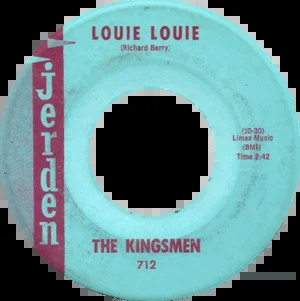 Kingsmen LouieLouie Jerden 800
Kingsmen LouieLouie Jerden 800
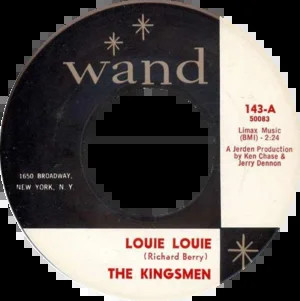 Kingsmen LouieLouie Wand 800
Kingsmen LouieLouie Wand 800
The Kingsmen’s “Louie Louie” initially appeared on Jerden Records before being picked up by Wand Records for nationwide distribution.
The Kingsmen’s “Louie Louie” Lyrics and Garage Rock Transformation
While Jack Ely’s famously raucous and often-misunderstood vocals command most of the attention, it’s important to remember that The Kingsmen were a self-contained band, playing their own instruments and providing their own backing vocals. The lineup at the time of the recording included:
- Lynn Easton, drums
- Jack Ely, rhythm guitar
- Don Gallucci, keyboards
- Mike Mitchell, lead guitar
- Bob Nordby, bass guitar
Here are the lyrics performed by The Kingsmen in their iconic rendition of “Louie Louie”:
Louie Louie (oh, no), said me gotta go (yeah, yeah, yeah, yeah, yeah). I said, Louie Louie (oh, baby), I said baby, we gotta go.
A fine little girl, she waits for me. Me catch the ship across the sea. Me sailed that ship all alone. Me never think how I’ll make it home
Louie Louie (yeah, yeah, yeah, yeah) I said we gotta go (oh, no). Said Louie Louie (oh, baby), said we gotta go.
*
Three nights and days I sailed the sea. Me think of girl (oh) constantly. On that ship, I dream she there. I smell the rose in her hair.
Louie Louie (oh, no) said we gotta go (yeah, yeah, yeah, yeah, yeah, yeah). Louie Louie (oh, baby) said we gotta go.
(Okay, let’s give it to them right now!)
**
Me see Jamaica, the moon above. It won’t be long me see me love. Me take her in my arms and then, I tell her I’ll never leave again.
Louie Louie (oh, no), said we gotta go (yeah, yeah, yeah, yeah, yeah). Said Louie Louie (oh, baby), said we gotta go. I said we gotta go now. Let’s hustle on out of here. Let’s go!
A careful comparison of the lyrics sung by Jack Ely in The Kingsmen’s “Louie Louie” (1963) with Berry’s original reveals a remarkable similarity. The primary lyrical differences lie in Ely’s pronunciation of the title as “Loowee Loowie” and his ad-libs – the oh-no’s, oh-baby’s, and numerous yeah’s, indicated in parentheses above.
Musically, however, The Kingsmen’s version diverges more significantly. They replaced the doo-wop bass vocal line with a prominent organ riff and substituted the instrumental bridge with a raw and energetic guitar solo. Beyond these changes, the song remains structurally the same.
The Kingsmen’s rendition abandons any pretense of calypso influence. Instead, Ely’s vocal delivery sounds almost unhinged, while the band’s playing exudes an energetic, almost reckless sloppiness – a “rehearse? Nah—we got this!” ethos. This raw energy and unpolished sound have led many rock historians to categorize The Kingsmen’s “Louie Louie” as proto-garage, or even the first commercially successful garage rock anthem.
* Adding to the song’s rebellious mystique, a genuine four-letter word made its way into the recording. Immediately after the second chorus, drummer Lynn Easton dropped his drumstick, resulting in an audible yell of “Fuck!”
** Another unplanned moment occurred after the instrumental bridge and guitar solo, when Ely mistakenly comes in early with “Me see,” then has to pause and wait for the band to conclude the bridge.
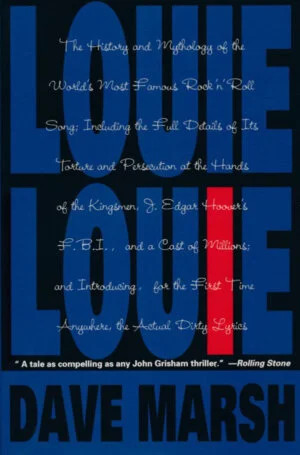 DaveMarsh LouieLouie later edition 600
DaveMarsh LouieLouie later edition 600
Dave Marsh’s comprehensive book, “Louie Louie: The History And Mythology Of The World’s Most Famous Rock ‘n’ Roll Song,” explores the song’s enduring legacy.
The Infamous Second Verse: Decoding the “Dirty” Lyrics
Reader Jim Miller contributed a comment, highlighting the widespread misinterpretation of the second verse. Many listeners believed they heard the lines: “Every night at ten, I laid her again. I fucked that girl all kinds of ways.”
Corroborating this, the New Yorker article mentioned that others perceived the same lines as: “At night at ten, I lay her again. Fuck you girl, oh, all the way.”
These misheard lyrics fueled the controversy and contributed significantly to the song’s notoriety and underground appeal.
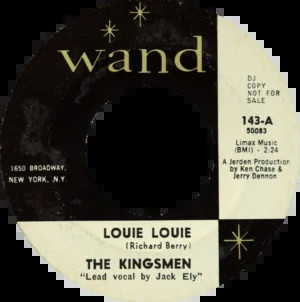 Kingsmen LouieLouie Wand Ely dj 800
Kingsmen LouieLouie Wand Ely dj 800
Later pressings of The Kingsmen’s “Louie Louie” on Wand Records, following a legal settlement, credited “Lead vocal by Jack Ely” below the title.
Chart Performance and Sales of “Louie Louie”
While Richard Berry’s original version of “Louie Louie” reportedly received some radio airplay and some sources claim sales exceeding 100,000 copies, it did not break into any national best-selling charts. However, The Kingsmen’s rendition, despite the lyrical controversy, became a monumental hit. It reached the #1 spot on the Cash Box chart for two weeks in January 1964.
Notably, “Louie Louie” marked the last chart-topping single by an American artist before the British Invasion, spearheaded by The Beatles, dominated the #1 position for the subsequent sixteen weeks. On the Billboard charts, “Louie Louie” achieved considerable success, holding steady at #2 or #3 for six weeks between December 1963 and January 1964, but ultimately fell short of the top spot.
The song faced de facto bans from certain radio stations due to the perceived lyrical content. In Indiana, Governor Matthew Welsh, convinced of the song’s obscenity, reportedly banned it from airwaves across the state (though the legal mechanism for such a ban remains unclear). It’s plausible that these piecemeal radio bans hindered the song’s ascent to the very top of the charts.
Intriguingly, “Louie Louie” experienced a resurgence in May 1966, re-entering the Cash Box Top 100 for five weeks and peaking at #65.
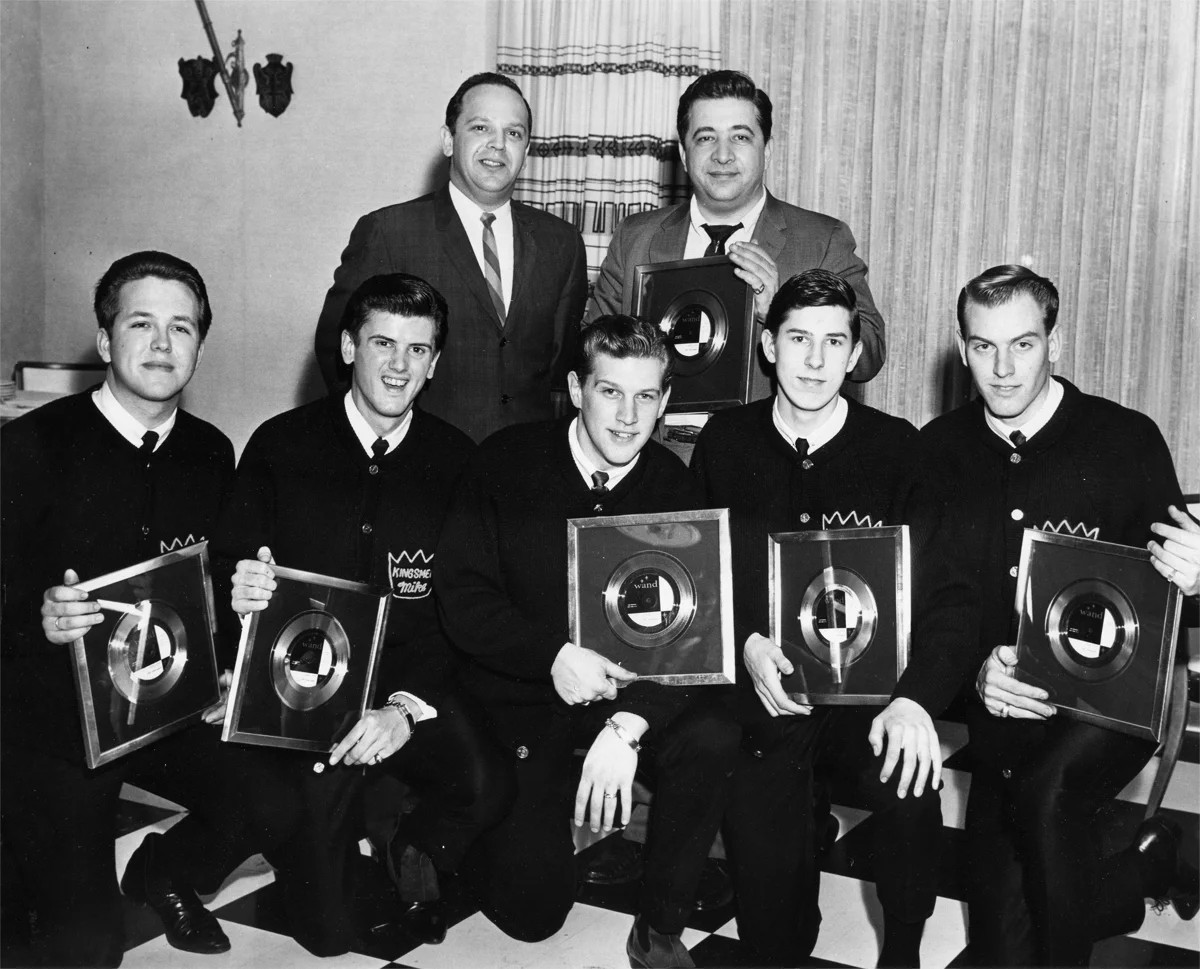 Kingsmen LouieLouie GoldRecord 1200
Kingsmen LouieLouie GoldRecord 1200
The Kingsmen received an in-house gold record award from Wand Records for “Louie Louie,” although by this time, several original members had departed the band.
Sales Figures and Enduring Legacy
Regarding the sales of “Louie Louie,” Wikipedia contributors cite estimates ranging from 10,000,000 to over 12,000,000 copies for The Kingsmen’s single, with cover versions adding another 300,000,000 to the total. The first figure is attributed to liner notes by Peter Blecha for the 1983 Rhino Records compilation The Best Of Louie Louie.
However, Joseph Murrells’ Million Selling Records From The 1900s To The 1980s simply lists the record as a million-seller. Furthermore, major websites that compile lists of best-selling singles globally do not typically include The Kingsmen’s “Louie Louie.” Notably, the song has never been officially certified Gold by the RIAA (Recording Industry Association of America).
The source for the staggering 300,000,000 figure for cover versions is attributed to a 1986 Los Angeles Daily News article by Lewis Beale, “After 23 years, ‘Louie Louie’ Cooler Than Ever”. Beale states, “To date, the Kingsmen’s version of the tune has sold more than 12,000,000 copies, and the thousand or so cover versions might have sold as many as 300,000,000 records.”
This claim of 300 million sales from cover versions is arguably astonishing, requiring an average sale of 300,000 copies for each of the estimated thousand cover versions. This would imply countless versions of “Louie Louie” consistently reaching the national Top 100 charts for decades, which did not occur.
Regardless of the precise sales figures, “Louie Louie” undeniably remains a quintessential rock & roll recording and one of the most frequently recorded songs in the past six decades of pop music. Its simple structure, infectious rhythm, and the enduring mystery surrounding its lyrics have cemented its place in music history.
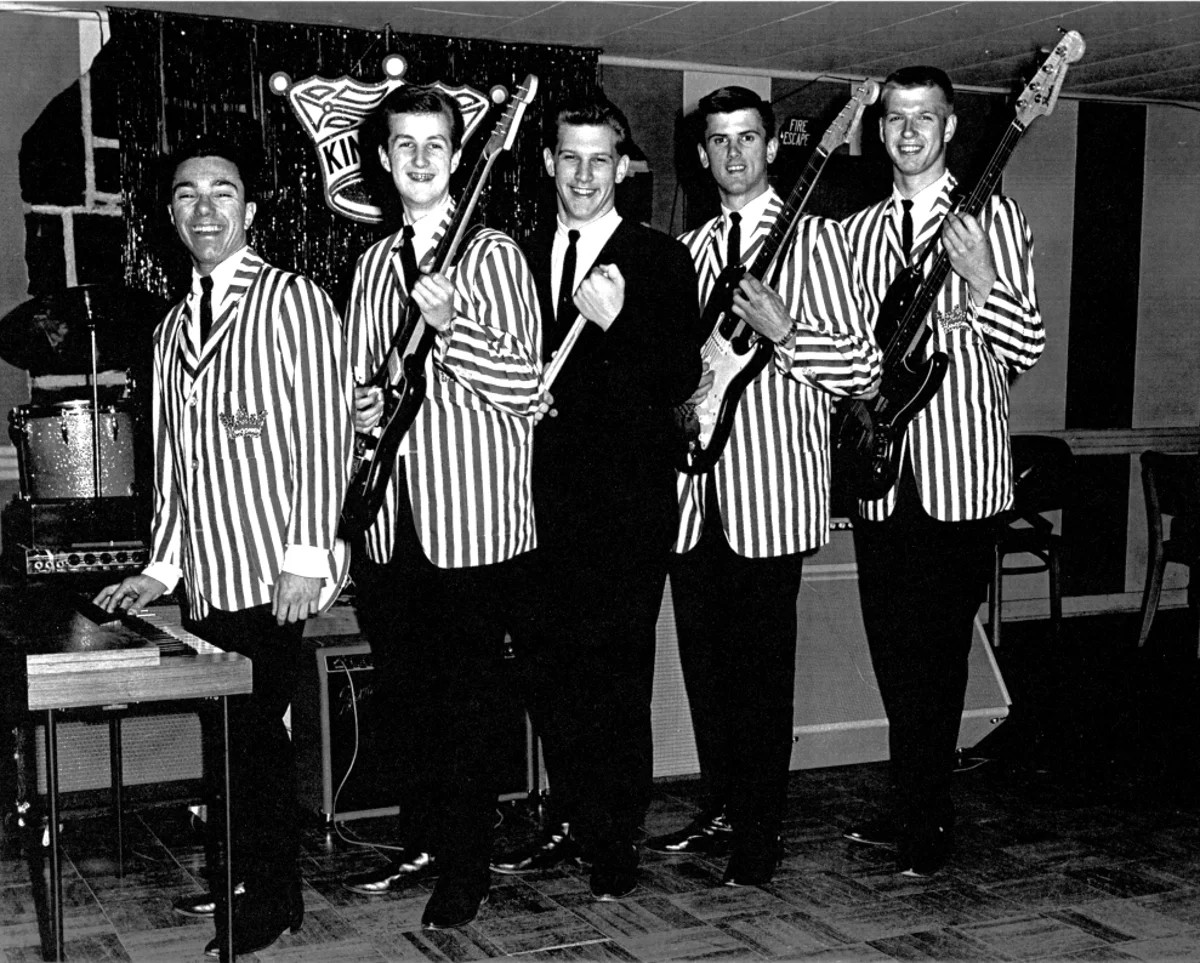 TheKingsmen 1963 1200
TheKingsmen 1963 1200
The Kingsmen in 1963: (left to right) Don Gallucci, Jack Ely, Lynn Easton, Mike Mitchell, and Bob Nordby.
FEATURED IMAGE: The lead image at the top of this article is a cropped section from the photograph above, depicting The Kingsmen in the early 1960s with Jack Ely. Photos from this era featuring Ely as a band member are relatively scarce.
For those seeking deeper exploration, numerous websites are dedicated to The Kingsmen and “Louie Louie.” One notable resource is The Louie Report (“The blog for all things LOUIE LOUIE”), accessible here.
Dave Marsh’s book, Louie Louie: The History and Mythology of the World’s Most Famous Rock ‘N’ Roll Song, offers an even more comprehensive account.
By Neal Umphred.

